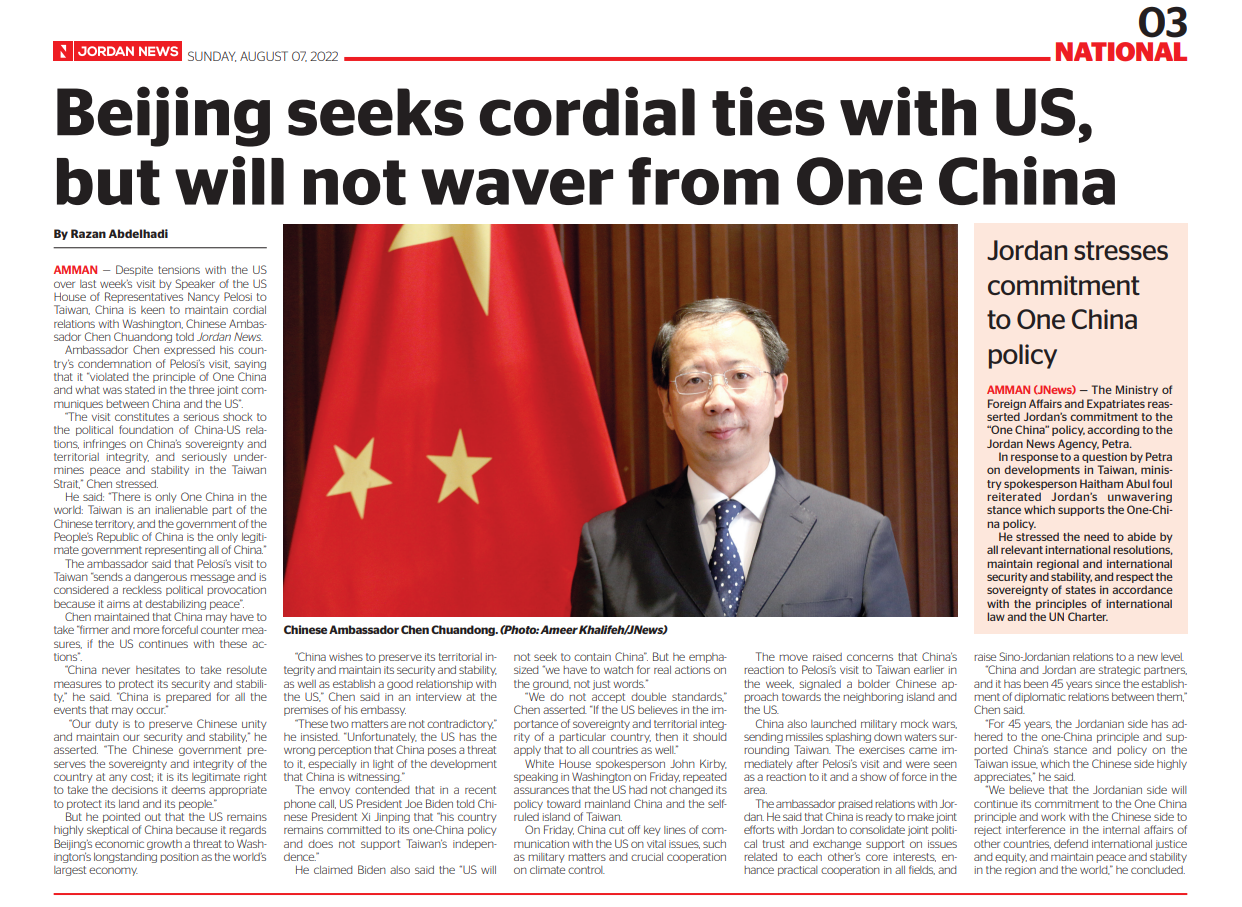| Ambassador Chen Chuandong Speaks to Jordan News on US House Speaker Nancy Pelosi’s Visit to China’s Taiwan Region |
| 2022-08-10 16:21 |
|
On August 7, Jordan News published an interview with H.E. Chen Chuandong on US House Speaker Nancy Pelosi’s visit to China’s Taiwan region. Ambassador Chen expressed China’s firm position and answered questions on China-US relations and Jordan's adherence to the one-China principle. The transcript of the interview is as follows.
Q: What signal do you think Pelosi's visit to Taiwan has released? A: I don't know what message she intended to send, but whatever ulterior motives she has, they are unlikely to succeed. For China, the message the world received from Pelosi's visit to Taiwan is that the U.S. is sending a very wrong signal to the "Taiwan independence" separatist forces, it is a serious violation of the one-China principle and provisions in the three Sino-US Joint Communiqués, it deals a serious blow to the political foundation of China-US relations, seriously infringes on China’s sovereignty and territorial integrity, and it seriously undermines peace and stability in the Taiwan Strait. Pelosi's visit harms China's core interests and challenges the common aspiration of more than 1.4 billion Chinese people, which is an extremely dangerous move. Q: Why is China's response this time more forceful than before? A: A past mistake does not make a future one right. Some people are playing the trick of “thief crying stop thief" by infringing upon China's sovereignty and then asking China to exercise "restraint" and avoid escalation. Faced with serious political provocation from the US side, China must take resolute and forceful measures, in order to safeguard China's sovereignty and security, to maintain peace and stability in the Taiwan Strait, and to safeguard the basic norms of international relations. We are prepared for all possible developments, and if the U.S. is bent on its own course, China has the right to take all necessary measures at any cost to safeguard sovereignty, territorial integrity and unity of the nation. Q: Is there any connection between the current crisis in Ukraine and China's harsh countermeasures against U.S.? A: There is no connection between the two matters, and they should not be mixed up. No matter when or under what circumstances the visit to Taiwan occurs, China’s determination to firmly defend its sovereignty remains unwavering. Since you mentioned the Ukraine crisis, I would like to say that since some countries are so loud about respecting sovereignty and territorial integrity of countries, this principle must apply to all countries, including the Taiwan question. The practice of double standards should be rejected. Such practice has been witnessed time and again in the region on issues such as refugees and human rights, and Middle East countries are very much aware of this. We urge some countries to abandon double standards and respect sovereignty and territorial integrity of all countries. Q: How would China choose between having good relations with the United States and achieving national reunification? A: I don't think these two things are contradictory. As the largest developing country and the largest developed country in the world, we hope that China and the United States will develop normal and good relations. But unfortunately, in recent years, the U.S. has developed wrong perception of China. It sees China as a threat to its hegemony, and some US politicians blame China for all kinds of its own problems, be it domestic or international, which is very ridiculous. A great power that lacks self-confidence becomes weak inside, and is more likely to go down the wrong path. The Taiwan question has been used by some US politicians as a tool to contain China. It is the most important and most sensitive issue at the very heart of China-U.S. relations. When President Joe Biden spoke with President Xi Jinping, he reiterated US commitment to "five NOs" (i.e. not seeking a "new Cold War"; not seeking to change China's system; the revitalization of its alliances is not against China; not supporting "Taiwan independence"; not looking for conflict with China). As we say, listen to the words and watch the deeds, we hope that the US side will translate these commitments into practice, realizing that maintaining stability in the Taiwan Strait is in its own interest, effectively correct its mistakes, refrain from any further provocative moves, and return US-China relations to the right track of mutual respect, peaceful coexistence, and win-win cooperation. Taiwan’s return to motherland is a long-cherished aspiration of more than 1.4 billion Chinese people, and no one should try to block China's national reunification. Q: How do you evaluate the position of the Jordanian side on this issue? A: The 181 countries around the world that have diplomatic relations with China all share a common political foundation in their relations with China. That is the one-China principle. There is only one China in the world, Taiwan is an inseparable part of China's territory, and the Government of the People's Republic of China is the sole legal government representing the whole of China. China and Jordan have a long history of friendship and are strategic partners. This year marks the 45th anniversary of the establishment of diplomatic relations between China and Jordan. Over the past 45 years, Jordan has firmly adhered to the one-China principle and supported China's position on the Taiwan question, which China highly appreciates. We are convinced that Jordan will continue to firmly support the one-China principle, and both sides will continue to render mutual support on issues related to each other's core interests, jointly oppose interference in the internal affairs of other countries, safeguard fairness and justice in international affairs, and maintain peace and stability in the region and the world. |

